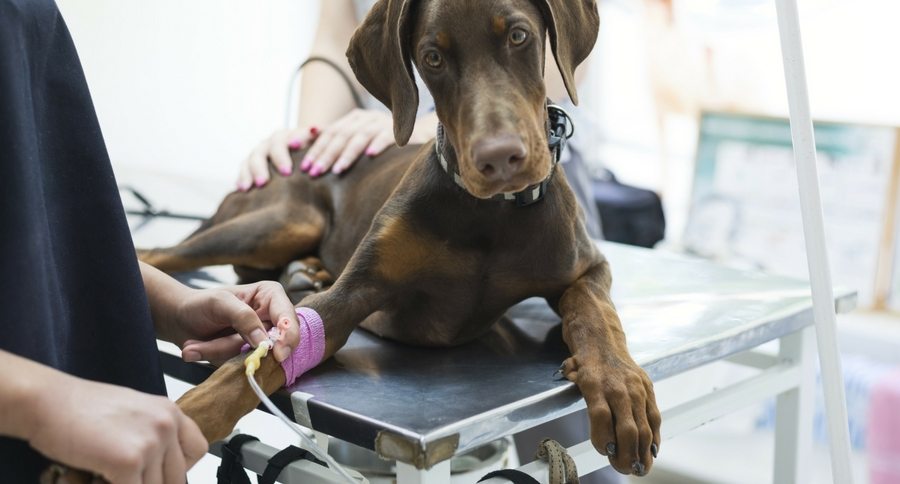Pancreatitis is the inflammation of your dog's pancreas. This can be chronic or acute and is often seen around Thanksgiving!
Pancreatitis is a very scary illness (can be fatal in some instances) and once your pet gets this once, it's likely to reoccur. It can get worse and worse each time. The pancreas is an organ that produces and stores enzymes for digestion, sitting alongside your dog's small intestine.
High fat diets can cause low grade re-occurring pancreatitis, which can be mild or life threatening. So around the holidays when pet owners accidentally give their dog a piece of turkey (or any other rich table scraps) dripping with butter, veterinary hospitals get busy with pancreatitis cases.
Some dogs are pre-disposed to pancreatitis like the Schnauzer or Miniature Schnauzers. Stress and some medications (e.g. prednisone) can cause this as well. Pancreatic disease can also develop in older dogs, as well as dogs predisposed to obesity.
Certain conditions may predispose a dog to pancreatitis. These include diabetes mellitus (though it is not clear whether pancreatitis precedes diabetes), acute hypercalcemia (high levels of calcium in the blood, usually from a calcium infusion or poisoning rather than diet or supplements), hyperlipidemia (high fat content in the blood, again usually due to metabolic disorder rather than diet), hypothyroidism, and Cushing's disease (hyperadrenocorticism).

Common Symptoms
Pancreatic inflammation in dogs is a painful disease that causes vomiting and dehydration. Clinical signs will depend on whether it's a mild case or a more acute pancreatitis.
- Fever
- Lethargy
- Abdominal Pain or Nausea
- Anorexia or weight loss
- Vomiting
- Dehydration
- Diarrhea
- Depression/Obesity
When the pancreas is inflamed, the pancreatic enzymes are activated prematurely due to a high-fat diet. The enzymes that are produced with a high-fat diet are different than the enzymes produced when breaking down proteins. That means, when a dog is fed foods high in fats the enzymes produced actually start breaking down the pancreas.
Diagnosis
Bloodwork is imperative in diagnosis, including a complete blood count (CBC) and biochemistry profile which typically reveal abnormalities that are suggestive of pancreatitis. But the cPLI test is what your veterinarian will recommend. X-rays may also be done in severe cases.
A cPLI blood test will help identify the lipase and amylase levels (are they increased?) that cause inflammation of the pancreas. VCA Hospitals explains:
"Pancreas-specific lipase is measured with a test called Canine Pancreatic Lipase Immunoreactivity, known simply as cPLI. The test requires only a small blood sample. A fasting sample is preferred, but it is not essential for the accuracy of the test."
https://www.youtube.com/watch?v=sjGCdG6OgV0
Treatment
The goal is to calm down the pancreas. The mainstay of therapy of severe canine pancreatitis is supportive care with fluid therapy, vigorous monitoring, and early intervention to prevent systemic complications. Hospitalization is typically needed and intravenous fluids are administered. Treatment also depends on whether acute pancreatitis is diagnosed.
Sometimes fasting is used as a treatment method and food is held for 24 hours. Pet owners shouldn't proactively do this though on their own; the veterinarian will advise what the treatment plan will be.
VCA Hospitals also reported that when it comes to treatment:
"Analgesics will be given to control the intense pain and intravenous fluids will be given to maintain normal fluid and electrolyte balance. Many cases will also require anti-inflammatory drugs or medications to control vomiting or diarrhea. Most dogs with pancreatitis are hospitalized for two to four days while intravenous fluids and medications are administered and food is gradually re-introduced."
A low-fat diet will likely be recommended.
Breeds Impacted?
Most dogs with pancreatitis are middle-aged or older, overweight, and relatively inactive. Cavalier King Charles Spaniels, Miniature Poodles, Collies, and Boxers have been shown to have an increased relative risk of chronic pancreatitis, and Cocker Spaniels an increased relatively high risk of acute and chronic pancreatitis combined.
Holistic advice?
Add a rich source of digestive enzymes in your dog's diet as a supplement. Our advice is to make sure your dog avoids fatty foods! And stays away from fatty people food!
A wonderful resource for pet owners (albeit for nerdy owners) is the Merck Veterinary Manual.
Have you ever had a dog diagnosed with dog pancreatitis? Please let us know if you have any advice for others in the comments.
WATCH THIS: Zuke's Power Bones Are for Active Dogs




